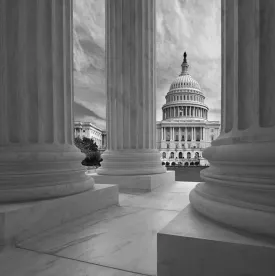The transition to a new administration with the election of Republican Donald J. Trump as President, along with continued Republican control of the Senate and House of Representatives, promises to bring substantial change to each of the federal financial regulatory agencies. Changes in leadership at those agencies will likely result in substantial changes in policy regarding regulations, compliance, enforcement, and transactions. While these transitions will take place over different time frames depending on the agency, there is unique uncertainty regarding how quickly the transition will take place at the Consumer Financial Protection Bureau (“CFPB” or “Bureau”) and what that transition will entail.
The uncertain situation at the CFPB results, in part, from the fact that the Bureau is a new agency that has not previously experienced a change in administration. Moreover, the Bureau has been a controversial agency from its inception and it currently faces substantial questions about the constitutionality of its single-Director structure, threats of Congressional disapproval of its recent and planned regulations, and legislation designed to change its structure and funding.
CFPB Structure and the Effects of the PHH Decision
The CFPB is led by a single Director who is appointed by the President, with the advice and consent of the Senate, to a five-year term. Under the Dodd-Frank Wall Street Reform and Consumer Protection Act (“Dodd-Frank Act”), the President may remove the Director only for cause ‒ that is, for “inefficiency, neglect of duty, or malfeasance in office.” See 12 U.S.C. § 5491(c)(3).
A three-judge panel of the U.S. Court of Appeals for the D.C. Circuit recently held that the CFPB’s single-Director structure, with termination only for cause, is unconstitutional under Article II of the U.S. Constitution. See PHH Corp. v. Consumer Financial Protection Bureau, No. 15-1177 (D.C. Cir., Oct. 11, 2016) (“PHH”). To remedy that flaw, the court severed the “for-cause” removal provision, giving the President the power to remove the Director at will. On November 18, 2016, the CFPB petitioned the full D.C. Circuit to rehear the case en banc. Respondent Consumer Financial Protection Bureau’s Petition for Rehearing En Banc, No. 15-177 (D.C. Cir., Nov. 18, 2016) (Doc. #1646917). There is no definitive timetable for the Court’s decision on whether to rehear the case, or on how quickly it would resolve the case if rehearing took place. Absent rehearing, the Bureau could file a petition for certiorari to the Supreme Court.
The CFPB is currently led by Director Richard Cordray, whose term is set to expire in July 2018. The outcome of the PHH appeal may determine whether Director Cordray is allowed to serve out his term ─ unless the President seeks to fire him “for cause.” In addition, there is speculation that Director Cordray may seek to run for Governor of Ohio in 2018, which may lead him to resign before the end of his term. Any replacement for Director Cordray would have to be nominated by the President and confirmed by the Senate. In the case of a vacancy, the Deputy Director of the CFPB would serve as acting Director pending confirmation of a new Director. 12 U.S.C. § 5491(b)(5).
Status of Recent Rulemakings and the Congressional Review Act
In 2016, the CFPB finalized a number of rules, including a rule regulating prepaid cards, and issued proposals on two highly controversial rules involving a payday, high-cost installment, and vehicle title lending and mandatory arbitration clauses. These rules are now at risk of Congressional action to prevent them from going into effect.
Under the Congressional Review Act (the “CRA”), 5 U.S.C. § 801 et seq, Congress may (in certain circumstances) invalidate a new agency rule before it takes effect. Upon finalizing a rule, the agency must submit a report to each house of Congress and the Comptroller General including, among other things, a copy of the rule. Congress then has 60 legislative days to pass a joint resolution disapproving of the rule. Under the CRA, a resolution of disapproval is not subject to a filibuster in the Senate so long as 30 senators sign and file a petition of disapproval. If the rule is disapproved, and the President does not veto the resolution of disapproval, the rule does not take effect and cannot be resubmitted in substantially the same form.
The Congressional Research Service has calculated that any final rule submitted to Congress after May 30, 2016 is subject to disapproval under the CRA. (This exact date may change depending on the legislative schedules the House and Senate set for the remainder of the year.) The prepaid card rule, which was submitted in October, a rule amending the existing mortgage servicing regulations, and all future CFPB rules would be subject to disapproval by the new Congress. While it is unclear whether, or to what extent, Congressional Republicans will target CFPB rules for disapproval, the balance of power on CFPB rules has shifted for the foreseeable future.
Legislation
President-elect Trump’s transition website promises his team will work “to dismantle the Dodd-Frank Act and replace it with new policies to encourage economic growth and job creation.” While the incoming Administration has not endorsed any particular legislative proposal, House Financial Services Committee Chair Jeb Hensarling’s Financial CHOICE Act is a possible starting point for legislative changes in the new Administration.
The CHOICE Act calls for the following changes to the CFPB:
-
Change the single director structure to a five-person commission akin to the FTC;
-
Make CFPB funding subject to the appropriations process;
-
Subject all CFPB rulemakings to cost-benefit analysis; and
-
Eliminate “abusive” from the Bureau’s “unfair, deceptive, or abusive acts or practices” (“UDAAP”) authority.
Congressional Democrats would strongly oppose many, if not all, of these changes, and it remains to be seen how committed the new Administration will be to reforming the CFPB.
Enforcement and Supervision
In addition to its rulemaking powers, the CFPB also enforces the consumer protection laws and supervises financial services companies within its jurisdiction.
As long as Director Cordray remains in office, we would not expect to see significant changes to the Bureau’s enforcement or supervisory activities. However, when the new Administration appoints a Director, or if Congress passes legislation transforming the CFPB into a multi-member board, the CFPB may pursue fewer precedent-setting enforcement actions, emphasize supervision over enforcement for supervised entities, and focus enforcement efforts on punishing clear-cut cases of bad actors engaging in fraud, deception, and similar wrongdoing.






 />i
/>i

